Which of the Ten Commandments gets quoted most often in General Conference? In this post, I’m going to look at some lists in the scriptures (like the Ten Commandments, the Articles of Faith, etc.) and show the relative popularity of the items in the list in terms of how often they’ve been quoted in Conference.
As I so often do, I got data from the LDS Scripture Citation Index to answer this question. They have data from Conferences from 1942 to 2013. Unlike with my other recent posts using their data, I took data not just at the level of book of scripture, but all the way down at the verse level, which of course was required to allow me to look at comparisons between individual verses.
So let’s get started. Which of the Ten Commandments is cited most? (For simplicity, I just looked at references to Exodus 20, and not to any other places in the scriptures that the Ten Commandments appear.)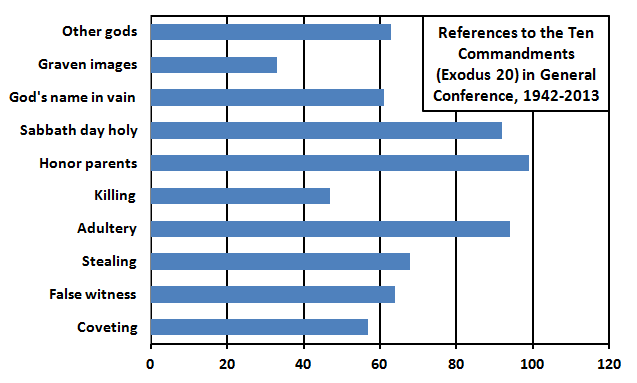
I wouldn’t have guessed that honoring father and mother would take the number one spot. At the other end, although it’s no surprise that the commandment against graven images would be the least cited, I do think it’s surprising that “thou shalt not kill” is the second-least cited. It seems to me that it’s clearly the most serious wrong on the list. In some sense, this reminds me of a discussion at fMh a few years ago when I wrote a guest post asking why there’s so much discussion of porn in the Church, even though it’s far less serious than the related issue of rape. Some people suggested in that discussion that the most serious sins were assumed to maybe be less of an issue because people weren’t doing them that much.
Let’s move from the Ten Commandments to the two great commandments. Again, for simplicity, I’m just looking at the most-often-cited location in Matthew 22.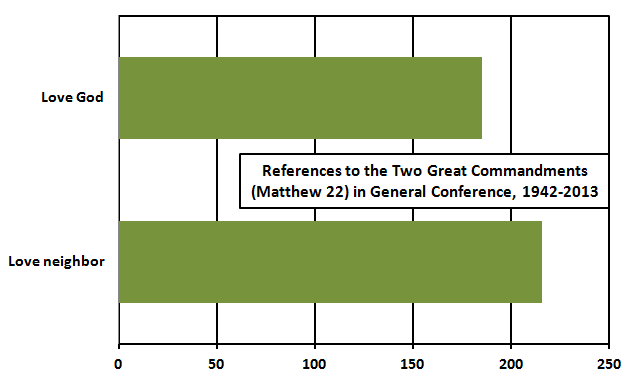 So, it looks like the second shall be first and the first shall be second, or something like that.
So, it looks like the second shall be first and the first shall be second, or something like that.
How about the Beatitudes? Again, I’m just looking at the most-often-cited spot, Matthew 5.
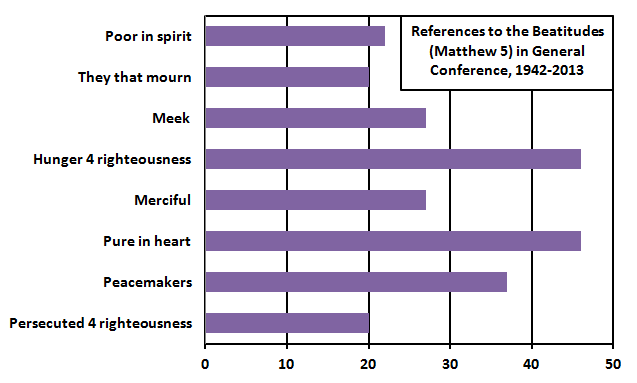 Here what I find surprising is the variability. I wouldn’t have guessed that there would be better than a two-to-one ratio of cites for the favorites versus the least preferred. It looks like they that mourn don’t get nearly the love that the pure in heart do, for example.
Here what I find surprising is the variability. I wouldn’t have guessed that there would be better than a two-to-one ratio of cites for the favorites versus the least preferred. It looks like they that mourn don’t get nearly the love that the pure in heart do, for example.
How about gifts of the Spirit? I know the original reference is in 1 Corinthians 12, but unfortunately, whoever made the verse divisions in our Bible wasn’t thoughtful enough to put each gift into its own verse, so I can’t tell even with verse-level cites which gift is being cited. Because of this, I took the easy way and I went to D&C 46, where there’s a one-gift-per-verse rule.
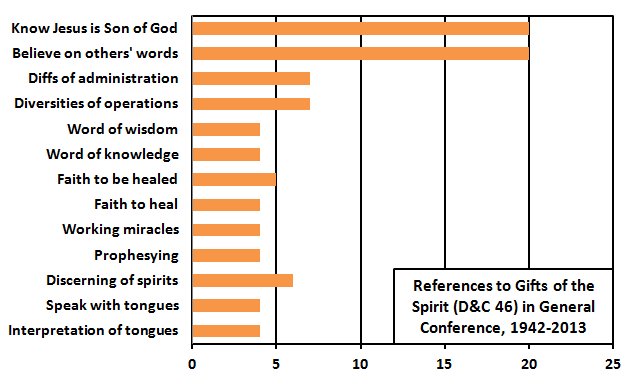 It looks like it’s the ones about a testimony of Christ that are by far the most cited. The rest are just afterthoughts.
It looks like it’s the ones about a testimony of Christ that are by far the most cited. The rest are just afterthoughts.
How about entire books? Here I counted all cites of verses in each book, and didn’t adjust for the total number of verses in the book. Here are the Five Books of Moses.
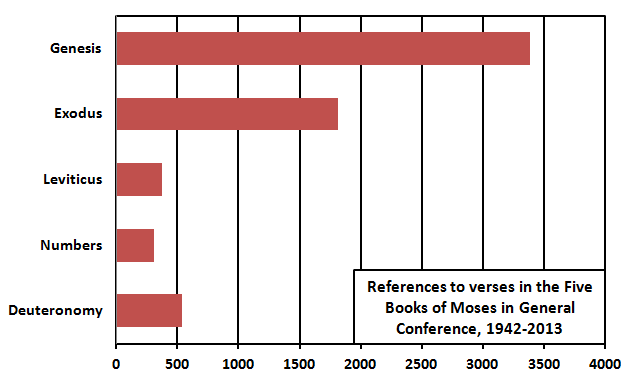 As a number lover myself, I feel kind of bad for the Book of Numbers.
As a number lover myself, I feel kind of bad for the Book of Numbers.
Let’s look at the Gospels.
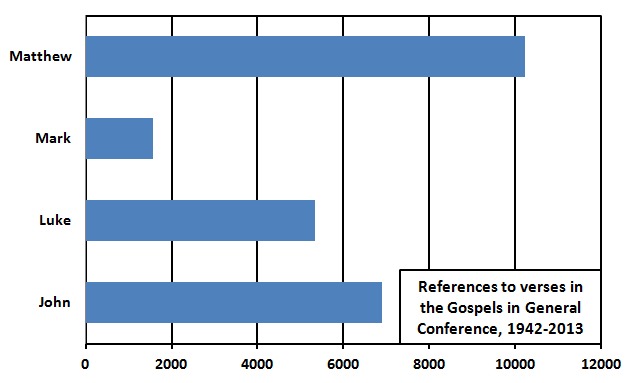 As I understand it, Mark is widely thought to be the oldest Gospel, but it’s by far the least cited. I guess we prefer our Gospels not in the raw, but with lots of bells and whistles added on.
As I understand it, Mark is widely thought to be the oldest Gospel, but it’s by far the least cited. I guess we prefer our Gospels not in the raw, but with lots of bells and whistles added on.
Next, I’ll look at a few lists where the individual items include more than one verse. For these lists, I’ll show not the total number of cites, but instead the number of cites per verse, to adjust for differing numbers of verses for each item in the list. For example, this next graph shows cites of verses in D&C 76 about places in the afterlife. There are 21 verses about the Celestial Kingdom (50-70), but only nine about the Telestial (81-89); dividing by the number of verses adjusts for such differences.
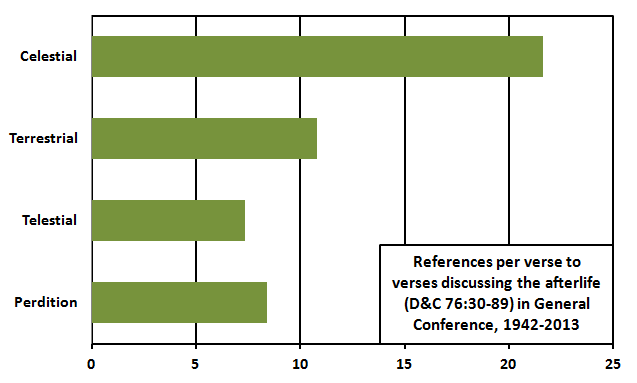 The Celestial Kingdom is far and away the winner, even with adjustment for number of verses in its passage. (Although, as Lynnette pointed out a few years ago, not everyone is that enthusiastic about it.)
The Celestial Kingdom is far and away the winner, even with adjustment for number of verses in its passage. (Although, as Lynnette pointed out a few years ago, not everyone is that enthusiastic about it.)
How about days of creation? I just stuck with the most-often-cited account in Genesis 1.
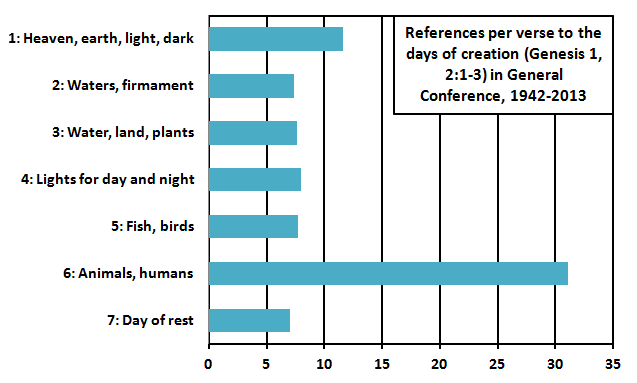 It should be no surprise, I guess, that the most-cited day of creation is about humans. We do tend to be anthropocentric. I would have thought that the seventh day would get more play, though, especially considering how often the commandment to keep the Sabbath Day holy is cited (see the first graph).
It should be no surprise, I guess, that the most-cited day of creation is about humans. We do tend to be anthropocentric. I would have thought that the seventh day would get more play, though, especially considering how often the commandment to keep the Sabbath Day holy is cited (see the first graph).
It’s a bit of a stretch to think of this as a list, but in my head, I always connect Sherem, Nehor, and Korihor as three great anti-Christs of the Book of Mormon. Here’s a graph showing cites per verse of passages about them.
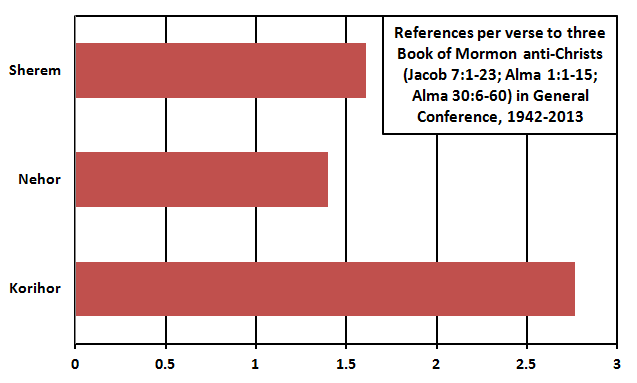 Even adjusting for passage length, Korihor rules. This squares with my experience, too. I’ve seen people call each other Korihor as an insult, but never Sherem or Nehor. Korihor is definitely the best known.
Even adjusting for passage length, Korihor rules. This squares with my experience, too. I’ve seen people call each other Korihor as an insult, but never Sherem or Nehor. Korihor is definitely the best known.
Okay, here’s one last one where we just have one verse per item again: the Articles of Faith.
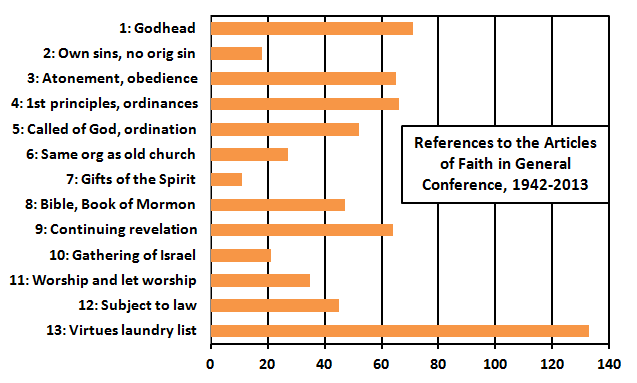 Wow! This one is really interesting. There’s tons of variability, and the number one by far is the catch-all AoF 13. I guess we’re not emphasizing gifts of the Spirit so much (at least not the ones listed in AoF 7; compare the fourth graph in this post) or defining ourselves in terms of being against Original Sin (AoF 2), or talking about the gathering of Israel (AoF 10), but I am still surprised at just how little these Articles of Faith are cited. I guess I should be happy that at least the one I’m putting hope in for changes in the Church I’d like to see (AoF 9) is still getting lots of air time.
Wow! This one is really interesting. There’s tons of variability, and the number one by far is the catch-all AoF 13. I guess we’re not emphasizing gifts of the Spirit so much (at least not the ones listed in AoF 7; compare the fourth graph in this post) or defining ourselves in terms of being against Original Sin (AoF 2), or talking about the gathering of Israel (AoF 10), but I am still surprised at just how little these Articles of Faith are cited. I guess I should be happy that at least the one I’m putting hope in for changes in the Church I’d like to see (AoF 9) is still getting lots of air time.
More fascinating stuff. Thank you.
It occurs to me we’re far and away more likely to use Alma when it comes to mourning with those that mourn.
Moroni or D&C for gifts of the spirit perhaps.
That may account for some of the difference.
Ha! This line made me laugh aloud:
“As a number lover myself, I feel kind of bad for the Book of Numbers.”
Two things jump out:
1. We’ve got to get more Leviticus and Numbers into our lectures, and
2. Korihor is such a show-off.
I definitely agree, larryco_, particularly about Korihor. He is totally full of himself and should just learn to sit down and take a back seat to the other anti-Christs now and again.
Hunter, thanks! I’m glad you liked that.
Hedgehog, thanks. Good point about several of these being in more places than one; definitely you’re right that Alma’s discussion in Mosiah 18 gets cited a lot. Verse 8 has been cited 60 times, verse 9 135 times, and verse 10 35 times.
” I always connect Sherem, Nehor, and Korihor as three great anti-Christs of the Book of Mormon.” Yes, the Unholy Trinity 🙂
Surprised Numbers beat Leviticus to the bottom. Makes me wonder if there’s not an outlier there that puts it over the top, since Leviticus has few stories and is so liturgical.